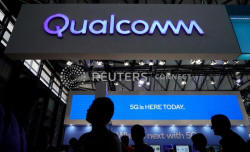|
Qualcomm is the world's biggest supplier of mobile phone chips.
The San Diego, California-based company said its new X60 modem
chip, along with a new antenna chip, will be the first to
aggregate signals sent over the disparate frequencies used in
the two variants of 5G networks, a feature the company said will
help boost download speeds.
5G communications, which are intended to improve data transfer
speeds and connect more devices to the internet, are expected to
be in wide use by the end of 2020. Qualcomm has said it believes
between 175 million and 225 million 5G smart phones will be sold
in 2020.
In many regions, 5G networks use so-called sub-6 frequencies,
but in some major markets such as the United States, the
networks will also use "millimeter wave" frequencies to deliver
faster data speeds in dense areas such as cities.
Qualcomm's modem chips can handle both variants, and the company
said the X60 chip is the first to offer what is called carrier
aggregation for both kinds of 5G. Using carrier aggregation,
telecommunications companies can send data over multiple bands
of wireless spectrum at once to generate faster speeds.
Qualcomm designs chips but has them manufactured by outside
partners. The company said the X60 chip will be made using
5-nanometer chip technology, which makes the chips smaller and
more power-efficient. Qualcomm did not disclose who would
manufacture the chips, but Reuters reported on Tuesday that
Samsung Electronics Co Ltd and Taiwan Semiconductor
Manufacturing Co Ltd had won the orders.
Qualcomm said it would start sending samples of the chips to its
customers in the first quarter of this year and that they would
start to show up in premium smart phones in early 2021.
(Reporting by Stephen Nellis in San Francisco; Editing by
Matthew Lewis)
[© 2020 Thomson Reuters. All rights
reserved.] Copyright 2020 Reuters. All rights reserved. This material may not be published,
broadcast, rewritten or redistributed.
Thompson Reuters is solely responsible for this content.

|
|





